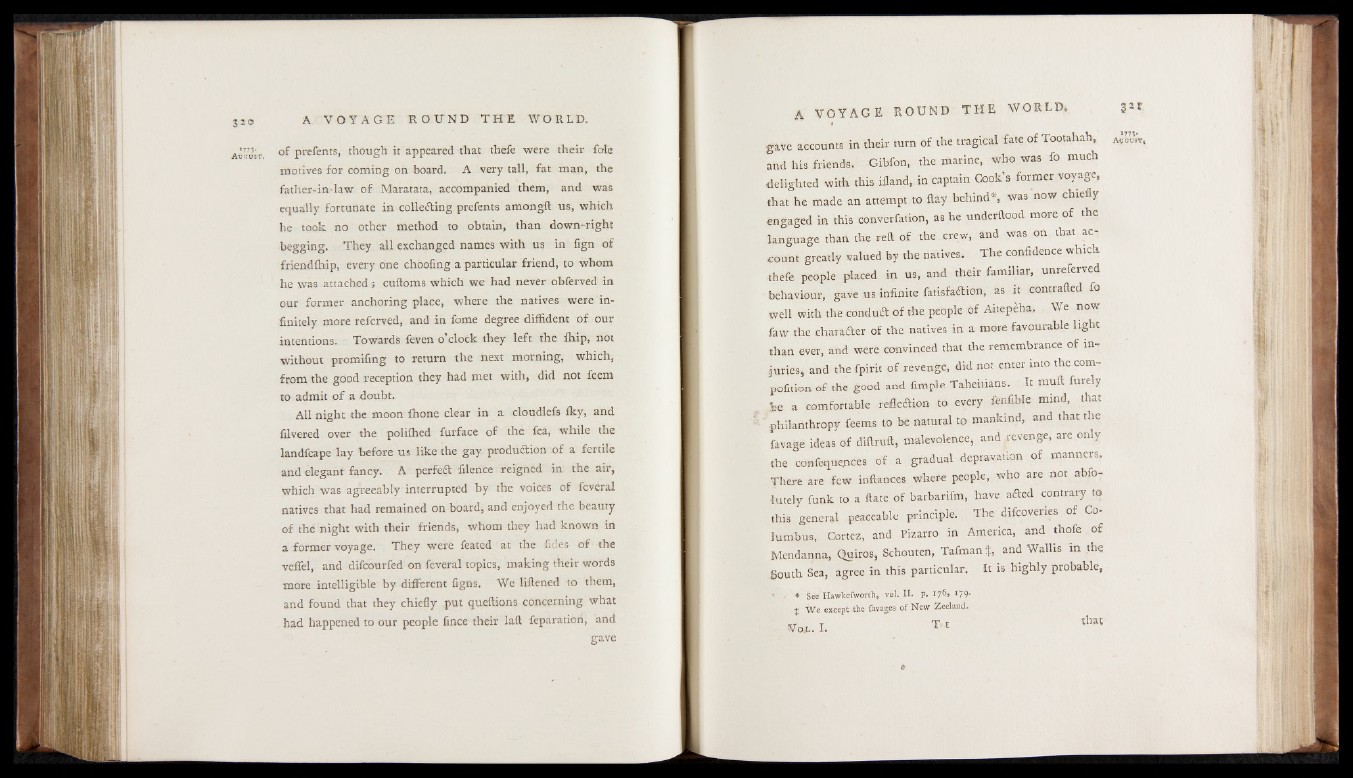
adjust of prefents, though it appeared that thefe were their foie
motives for coming on board. A very tall, fat man, the
father-in-law of Maratata, accompanied them, and was
equally fortunate in collecting prefents amongft us, which
he took no other method to obtain, than down-right
begging. They all exchanged names with us in fign of
friendfhip, every one choofing a particular friend, to whom
he was attached ; cuftoms which we had never obferved in
our former anchoring place, where the natives were infinitely
more referved, and in fome degree diffident of our
intentions. Towards feven o’clock they left the ffiip, not
without promifing to return the next morning, which,
from the good reception they had met with, did not feem
to admit of a doubt.
All night the moon fhone clear in a cloudlefs Iky, and
filvered over the poliffied furface of the fea, while the
landfcape lay before us like the gay produftion of a fertile
and elegant fancy. A perfeCt filence reigned in the air,
which was agreeably interrupted by the voices of feveral
natives that had remained on board, and enjoyed the beauty
of thé night with their friends, whom they had known in
a former voyage. They were feated at the fideS' of the
veffel, and difcourfed on feveral topics, making their words
more intelligible by different figns. We liftened to them,
and found that they chiefly put queftions concerning what
had happened to our people fince their laft feparation, and
gave
gave accounts in their turn of the tragical fate of Tootahah,
and his friends. Gibfon, the marine, who was fo much
delighted with this ifland, in captain Cook’s former voyage,
that he made an attempt to flay behind*, was now chiefly
engaged in this converfation, as he underftood more of the
language than the reft of the crew, and was on that account
greatly valued by the natives. The confidence which
thefe people placed in us, and their familiar, unreferved
behaviour, gave us infinite fatisfatftion, as it contrafted fq
well with the conduit of the people of Aitepeha. We now
faw the character of the natives in a more favourable light
than ever, and were convinced that the remembrance of injuries,
and the fpirit of revenge, did not enter into the com-
pofition of the good and fimple Taheitians. It muft furely
he a comfortable reflection to every fenfible mind, that
: philanthropy feems to be natural to mankind, and that the
favage ideas of diftruft, malevolence, and revenge, are only
the confeque.nces of a gradual depravation of manners.
There are few inftances where people, who are not abfo-
iutely funk to a ftate of barbarifm, have afled contrary to
this general peaceable principle. The difcovenes of Columbus,
Cortez, and Pizarro in America, and thofe of
Mendanna, Quiros, Schouten, Tafman %, and Wallis in the
South Sea, agree in this particular. It is highly probable,
* See Hawkefworthj vol. II. p. *7^ ’ *79*
X We except the favages of New Zeeland.
VOvL. I . T t
A^1G7U75S*Tt
that